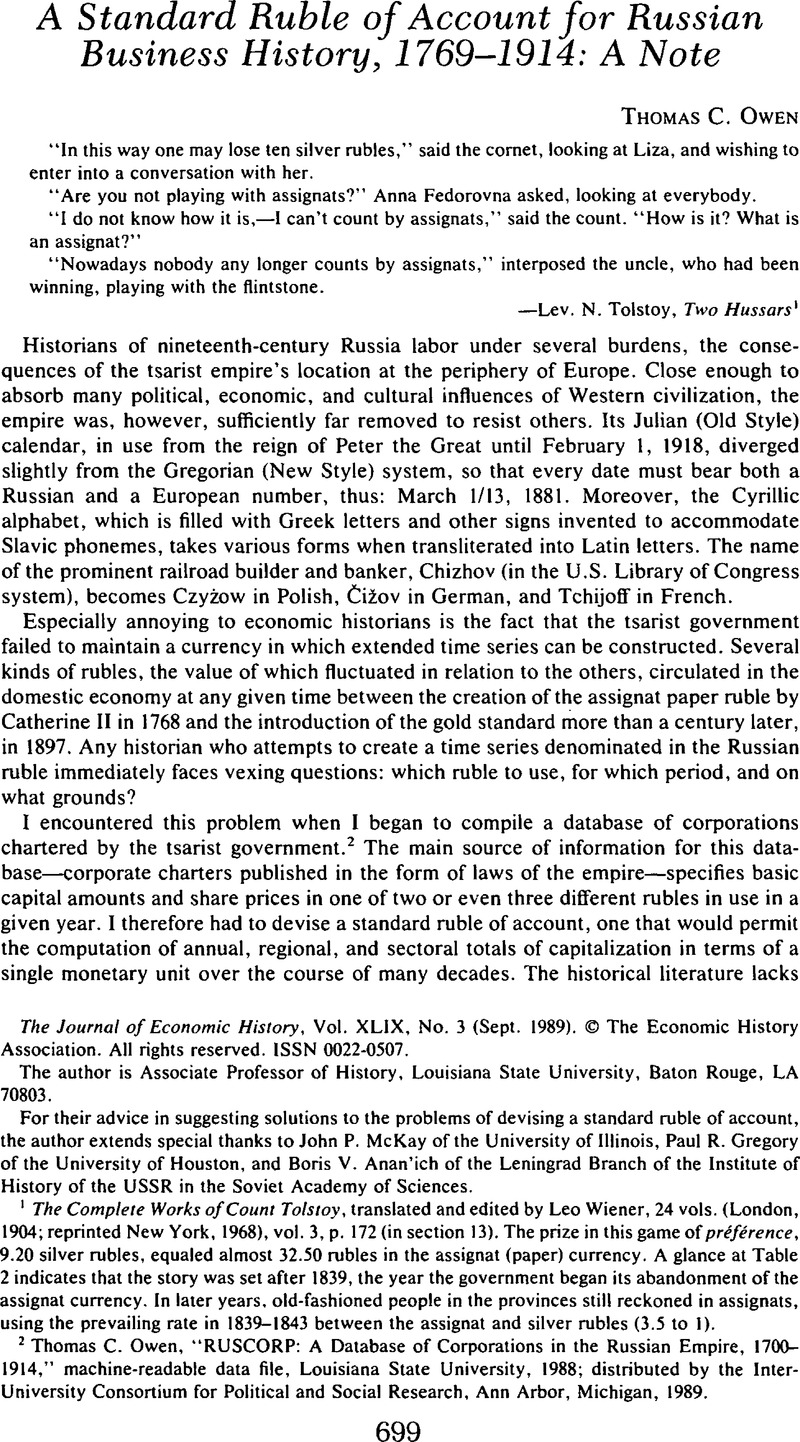Article contents
A Standard Ruble of Account for Russian Bussiness History, 1769–1914: A Note
Published online by Cambridge University Press: 03 March 2009
Abstract

- Type
- Notes and Discussion
- Information
- Copyright
- Copyright © The Economic History Association 1989
References
1 The Complete Works of Count Tolstoy, translated and edited by Wiener, Leo, 24 vols. (London, 1904; reprinted New York, 1968), vol. 3, p. 172 (in section 13). The prize in this game of préférence, 9.20 silver rubles, equaled almost 32.50 rubles in the assignat (paper) currency. A glance at Table 2 indicates that the story was set after 1839, the year the government began its abandonment of the assignat currency. In later years. old-fashioned people in the provinces still reckoned in assignats, using the prevailing rate in 1839–1843 between the assignat and silver rubles (3.5 to 1).Google Scholar
2 Thomas C. Owen, “RUSCORP: A Database of Corporations in the Russian Empire, 1700– 1914,” machine-readable data file, Louisiana State University, 1988; distributed by the Inter-University Consortium for Political and Social Research, Ann Arbor, Michigan, 1989.Google Scholar
3 “Kreditnyi rubl'“ [The credit ruble], Entsiklopedicheskii slovar' Brokgauza-Efrona [The Brockhaus-Efron encyclopedia], 41 vols. in 82 (Leipzig and St. Petersburg, 1890–1904), with 4-volume supplement (1905–7), vol. 17, p. 613.Google Scholar
4 Pintner, Walter M., Russian Economic Policy under Nicholas I (Ithaca, 1967), p. 215. Pintner's fine account of monetary policy includes on p. 186 P. Shtorkh's table of conversion between the silver and assignat rubles. It also contains an interesting discussion on pp. 256–63 of the so-called “popular rates” (prostonarodnye kursy) used by merchants to correct for gradual changes in relative values of the silver or assignat rubles in the 1820s and 1830s, a complication whose details do not affect the conversion tables offered here.Google Scholar
5 Boris N. Mironov, Khlebnye Iseny v Rossii za dva stoletii (XVIII–XIX vv.) [Grain prices in Russia in the eighteenth and nineteenth centuries] (Leningrad, 1985), p. 40.Google Scholar
6 Russia, Ministerstvo finansov, Ministerstvo finansov, 1802–1902 [The Ministry of Finance, 1802–1902], 2 vols. (St. Petersburg, 1902), vol. 2, pp. 419–31, esp. 423–25.Google Scholar
7 Aktsionernye kompanii v Rossii [Joint-stock companies in Russia] (Leningrad, 1973), p. 62.Google Scholar
8 Die Geld- und Kredirpolitik des Russischen Reiches in der Zeit der Assignaten (1769–1839/43) (Wiesbaden, 1983); ratios from Beilage III, p. 252. In his appendices Helter reproduces tables of ruble values originally published in P. Shtorkh [Storch], “MateriaIy dlia istorii gosudarstvennykh denezhnykh znakov v Rossii s 1653 po 1840” [Materials for a history of state banknotes in Russia from 1653 through 1840], Zhurnal ministersiva narodnogo prosveshcheniia [Journal of the Ministry of Public Education], 137 (Mar. 1868). pp. 772–847,Google Scholar and Kashkarov, M., Denezhnoe obrashchenie v Rossii [The circulation of money in Russia], 2 vols. (St. Petersburg, 1898). The erroneous figure is 71 2/3 silver kopeks per assignat ruble in 1802 in Mikhail M. Speranskii's list of conversions; the correct figure is 71 2/5 (in Kashkarov, vol. 1, p. 25).Google Scholar
9 For a discussion, with graph, of various price indices in Russia (1867–1913), see Gregory, Paul and Sailors, Joel W., “Russian Monetary Policy and Industrialization, 1861–1913,” this Journal, 36 (12 1976), p. 841, and references cited there.Google Scholar
10 Shtorkh, “Materialy,” pp. 828–30.Google Scholar
11 The published tables of the economist G. V. Butmi contained conversions from silver to credit rubles for 1867 and 1868, but unexplained variations in the number of decimal places and the polemical tone of the text cast suspicion on the reliability of these figures. Butmi's tables appear in Sergei F. Sharapov, Vopros o valiure na Orlovskom oblasinom s''ezde sel'skikh khoziaev (10–20 maia 1898 g.) po offitsial'nym dannym [The currency question at the Orel region agricultural congress, May 10–20, 1898, according to official data] (St. Petersburg, 1899), p. 22.Google Scholar
12 Nikol'skii, P. A., Bumazhnye den'gi v Rossii [Paper money in Russia] (Kazan, 1892); Kashkarov, Denezhnoe obrashchenie;Google Scholar and Zielinski, Ludwik, “Der Rubel jetzt und vor 100 Jahren,” Jahrbūcher für Nationalökonomie und Siaristik, III Folge, 16 (1898), pp. 433–82, 598–641.Google Scholar
- 7
- Cited by


